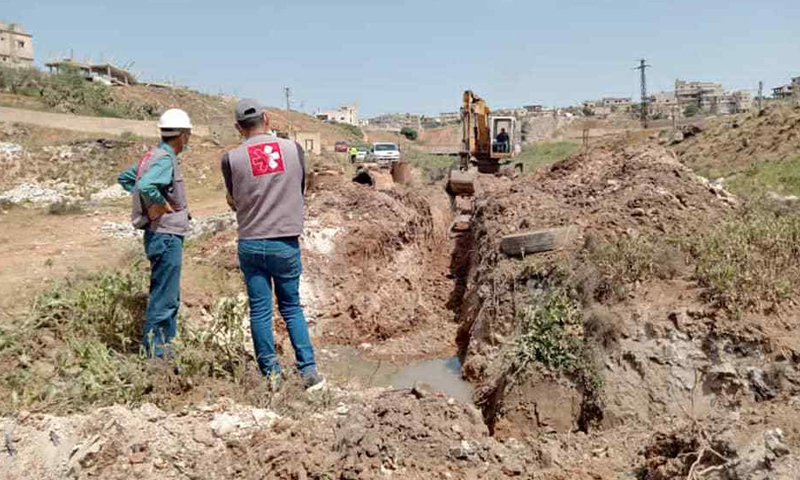



Daraa-Halim Muhammad
In the past a few years, residents of Daraa neighborhoods surrounding the Zaidi Valley constantly battled with sewer stench, mosquitoes, potential risks of drinking water contamination, and epidemics outbreaks. These hazards are consequeneces to aerial and artillery bombardment that damaged the main sewage lines in the region.
There had been fierce battles between the opposition and the Syrian regime in Daraa al-Balad neighborhoods since 2011. The Zaidi Valley used to be a frontline, which led to considerable damage in the sewage system there.
The Syrian regime, which is in control of Daraa, has not repaired the sewage damage yet. And the residents are unable to find an efficient solution for this problem.
Speaking on the condition of anonymity, a former local council member in Daraa al-Balad told Enab Baladi that “the barbaric bombing” destroyed large parts of the sewage system, causing wastewater to back up into the Zaidi valley.
Residents of Daraa city and Daraa al-Balad have been putting up with this environmental crisis for over five years; they cannot enjoy summer nights given unpleasant sewer odors and mosquito bites. The residents are very concerned about the possibility of drinking water contamination, which happened in 2020, in Tareq al-Sad neighborhood and Daraa Camp. Minor damage in the sewage lines polluted the potable water network in these two areas.
Omar, a 30-year-old resident of Daraa al-Balad, said that the inability to come up with effective solutions to the sewer line damage seriously concerns the residents of Daraa al-Balad because it endangered their health by denying them the right to clean air.
Due to frequent power cuts, residents cannot take the edge off the summer heat with fans. Besides, they have to close their windows all the time to prevent mosquitoes and insects from entering their homes. Omar said that summer in Daraa has become like “hell,” for the lack of electricity, clean air, and the government’s inaction to solve this problem.
Walaa Abdul Rahman, a 28-year-old resident of Tareq al-Sad neighborhood, believes that the sewage flooding in the Zaidi Valley is a “ticking time bomb” that may cause an environmental and health disaster if the government does not figure out radical solutions. The government has to start repairing sewage and potable water networks, operating the wastewater treatment plant, keeping the drinking water lines away from the polluted areas, and periodically and regularly spraying insects in summer.
Daraa al-Balad residents are extremely worried that the drinking water supply line will be damaged or disrupted after it has been submerged with wastewater. Actually, this portends an imminent health disaster for the people of Daraa al-Balad, Tareq al-Sad, and Daraa Camp, which are supplied with water from al-Ash’ari Springs, near the town of Jalin, in the western countryside of Daraa.
Though almost three years have passed since the so-called settlement agreement was signed in July 2018, which included the governorates of Daraa and Quneitra, government institutions have not presented a project for tackling the water crisis fundamentally. Instead, the Daraa City Council only cleaned some “sewers,” according to the statement of the head of the Daraa City Council, Eng. Amin al-Omari in Syrian pro-government newspaper Tishreen on 26 April.
Al-Omari added that Daraa’s City Council cooperated with an international organization to maintain some parts of the damaged networks and prepare a study to rehabilitate the main estuary and address the Ministry of Local Administration.
The war caused large sections of the sewage networks to go out of service within the neighborhoods of Daraa al-Balad, Tareq al-Sad, and Daraa Camp. Six kilometers of the main estuary- which draws wastewater from the city to the treatment plant near Kharab al-Shahem, in the city of Daraa- were also affected. The estuary stopped working as a result of the fighting.
The state-run Syrian Arab News Agency (SANA) reported on 26 April that Daraa’s City Council initiated a project to rehabilitate sewage networks in the neighborhoods of Daraa al-Baladi and Tareq al-Sad, with the support of the Première Urgence Internationale.
A former member of the local council told Enab Baladi that Daraa al-Balad residents, after the settlement agreement, have communicated with the Syrian regime, the concerned authorities from the Daraa City Council, technical services departments, and the provincial council for solving the sanitation and environment problems. But, all their calls fell on deaf ears.
The Central Committee- formed of notables, dismissed employees, and experts to follow up and supervise services in Daraa al-Baladi- provided reports with images and videos to shed light on the current situation of sewage, whether in neighborhoods or the main estuary. However, only “minor” reforms were implemented, the former council member said.
“Some sewer lines were unclogged, and a few manholes were also cleaned out, leaving the main estuary unfixed.”
In the wake of the military campaign launched by the Syrian regime and its main supporter, Russia, the opposition agreed to hand over their heavy and medium weapons and accepted their displacement for northern Syria, but on certain conditions; providing services to Daraa residents, restoring dismissed employees to their old jobs in the state institutions, and releasing detainees from regime-held prisons and detention centers.
However, none of these conditions were implemented according to the agreement. Multiple protests broke out in different parts of Daraa in the past two years due to the poor living conditions and lack of services.
if you think the article contain wrong information or you have additional details Send Correction